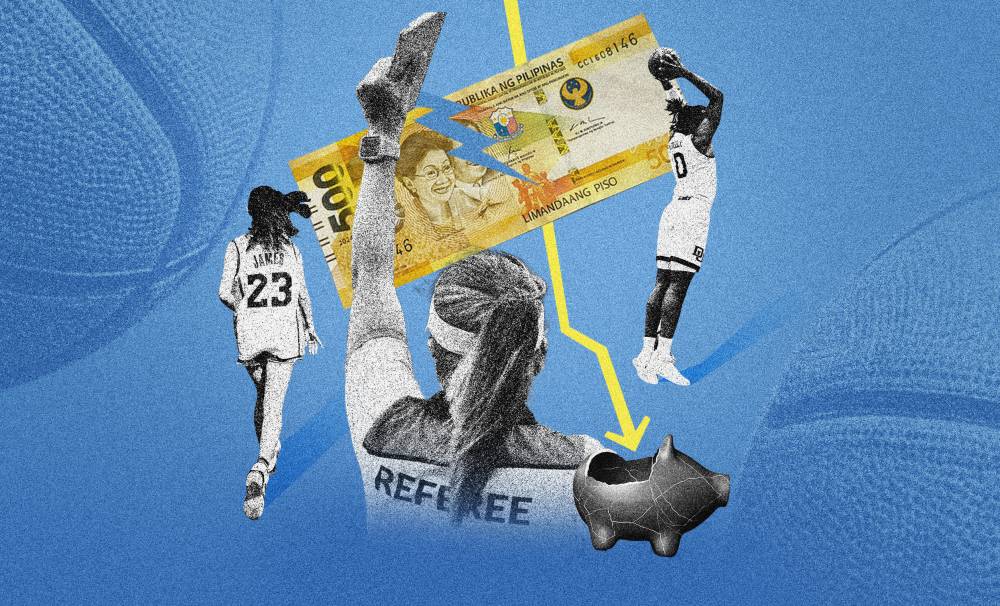UAAP’s regressive referee pay sparks pushback

Another day, another issue when it comes to women’s sports in the Philippines. For those who may not have caught the development that happened near the end of September, a report revealed that the University Athletic Association of the Philippines (UAAP) was operating under a new payment structure for referees this season: referees working women’s games were reportedly paid only P2,000 per game, compared to P3,000 for the men’s collegiate division and P2,500 for the men’s juniors division.
These new rates are higher for men’s games, while the women’s games rate is P500 lower than the previous season.
Two prongs don’t make a right
For those who may not see what the issue is with that, it’s two-pronged. The first prong is, of course, that the UAAP management has found a way to undercut referees’ pay despite the league making what we can only assume is a lot of income from a glut of brand sponsors, ticket sales, and a solid TV deal. Refereeing is still a tough job that requires a lot of experience and knowledge of the game, no matter who’s playing it, which is why they deserve to be paid fairly.
Second, and the more important issue: Paying referees less to officiate women’s games essentially tells everyone that that side of the sport is less skill-intensive, therefore not requiring as much compensation, aside from the gender bias and double standards, of course. UAAP Commissioner Jai Reyes pretty much admits this in his statement after the controversy blew up, saying: “Mas mabilis ang laro sa lalaki, so mas mahirap siyang pituhan (Men’s games are faster, and so are harder to officiate).”
On his part, Reyes has also attempted to downplay the entire controversy by posting a photo with a smiling female referee, implying that they didn’t take any issue with his policy.
Women speaking up for women
Of course, we’re in 2025 and thankfully, a lot more people know better (especially with the recent rise of women’s basketball), so the backlash was swift.
Players and their coaches, who are actually in the trenches of these games, called it out. Senator Pia Cayetano, an athlete in her own right, has stated publicly that this new system is actually a violation of both the Magna Carta for women and local labor laws. Women’s rights and welfare partylist Gabriela, through Rep. Sarah Elago, reinforced the call for both paying referees right and valuing women’s sports properly.
Women’s sports advocacy group Go Hard Girls has even started a public petition to the Philippine Commission on Women to address the UAAP’s regressive policy.
“This policy does more than reduce pay—it reinforces outdated stereotypes and undermines the legitimacy of women’s basketball,” said Go Hard Girls founder Ceej Tantengco-Malolos in the letter. “It discourages referees from officiating women’s games, threatens the quality of competition, and signals to athletes that their games are less worthy of professional standards.
“It communicates that women are second-class athletes in their own league, and that top-tier officiating is essential for men but optional for women. Furthermore, the implication that underperforming referees will be relegated to the women’s division and high-performing referees will be promoted to the men’s division poses a risk to the safety of the women athletes and the fairness of the games.”
“Referees officiating women’s games undergo the same training, spend equal time in the arena, and are tasked with upholding the same standards of fairness and safety—yet are paid less. In an already challenging economy with rising costs of living, this is unacceptable.”
They deserve better
Women in the field are already thankful for the exposure and the petition.
“On behalf of the Women’s Basketball Officials Association (WBOA), we sincerely thank you for raising this issue and for courageously standing up for gender equity in sports,” says Ivy Rose Villar, a female referee with the WBOA, about the petition.
“We can’t take one step forward with decisions that take three steps back,” says Kitkat Torre, sportswriter and courtside reporter for the Women’s Maharlika Pilipinas Basketball League. “2025 is the year for our female referees, athletes, coaches, and members of the sports community to be given the credit they deserve.”
The good thing is that it’s pretty clear, even to the non-basketball or women’s sports fan, how damaging and backwards the mere pay reduction is. Of course, there are still those who aren’t caught up to speed in the 21st century, but I like that, for the most part, we don’t have to explain ad nauseam why this isn’t a good look.
If anything, that’s a glimmer of hope—even if it seems like the UAAP may not be budging on this (until real legal action is threatened).

















